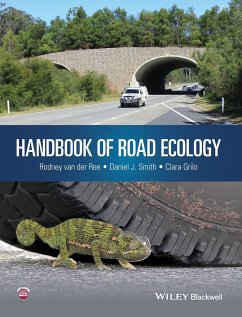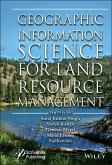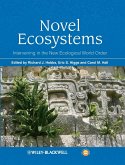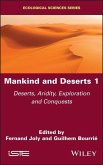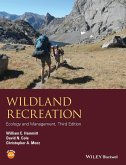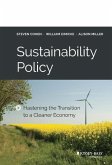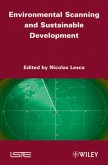- Gebundenes Buch
- Merkliste
- Auf die Merkliste
- Bewerten Bewerten
- Teilen
- Produkt teilen
- Produkterinnerung
- Produkterinnerung
This authoritative volume brings together some of the world's leading researchers, academics, practitioners and transportation agency personnel to present the current status of the ecological sustainability of the linear infrastructure - primarily road, rail and utility easements - that dissect and fragment landscapes globally. It outlines the potential impacts, demonstrates how this infrastructure is being improved, and how broad ecological principles are applied to mitigate the impact of road networks on wildlife.
Research and monitoring is an important aspect of road ecology,…mehr
Andere Kunden interessierten sich auch für
![Geographic Information Science for Land Resource Management Geographic Information Science for Land Resource Management]() Geographic Information Science for Land Resource Management248,99 €
Geographic Information Science for Land Resource Management248,99 €![Novel Ecosystems Novel Ecosystems]() Richard J. HobbsNovel Ecosystems100,99 €
Richard J. HobbsNovel Ecosystems100,99 €![Mankind and Deserts 1 Mankind and Deserts 1]() Mankind and Deserts 1187,99 €
Mankind and Deserts 1187,99 €![Wildland Recreation Wildland Recreation]() William E. HammittWildland Recreation64,99 €
William E. HammittWildland Recreation64,99 €![Sustainability Policy Sustainability Policy]() Steven CohenSustainability Policy69,99 €
Steven CohenSustainability Policy69,99 €![Environmental Scanning and Sustainable Development Environmental Scanning and Sustainable Development]() Nicolas LescaEnvironmental Scanning and Sustainable Development187,99 €
Nicolas LescaEnvironmental Scanning and Sustainable Development187,99 €![Microbiology of Drinking Water Microbiology of Drinking Water]() Gabriel BittonMicrobiology of Drinking Water158,99 €
Gabriel BittonMicrobiology of Drinking Water158,99 €-
-
-
This authoritative volume brings together some of the world's leading researchers, academics, practitioners and transportation agency personnel to present the current status of the ecological sustainability of the linear infrastructure - primarily road, rail and utility easements - that dissect and fragment landscapes globally. It outlines the potential impacts, demonstrates how this infrastructure is being improved, and how broad ecological principles are applied to mitigate the impact of road networks on wildlife.
Research and monitoring is an important aspect of road ecology, encompassing all phases of a transportation project. This book covers research and monitoring to span the entire project continuum - starting with planning and design, through construction and into maintenance and management. It focuses on impacts and solutions for species groups and specific regions, with particular emphasis on the unique challenges facing Asia, South America and Africa.
Other key features:
* Contributions from authors originating from over 25 countries, including from all continents
* Each chapter summarizes important lessons, and includes lists of further reading and thoroughly up to date references
* Highlights principles that address key points relevant to all phases in all road projects
* Explains best-practices based on a number of successful international case studies
* Chapters are "stand-alone", but they also build upon and complement each other; extensive cross-referencing directs the reader to relevant material elsewhere in the book
Handbook of Road Ecology offers a comprehensive summary of approximately 30 years of global efforts to quantify the impacts of roads and traffic and implement effective mitigation. As such, it is essential reading for those involved in the planning, design, assessment and construction of new roads; the management and maintenance of existing roads; and the modifying or retrofitting of existing roads and problem locations. This handbook is an accessible resource for both developed and developing countries, including government transportation agencies, Government environmental/conservation agencies, NGOs, and road funding and donor organisations.
Hinweis: Dieser Artikel kann nur an eine deutsche Lieferadresse ausgeliefert werden.
Research and monitoring is an important aspect of road ecology, encompassing all phases of a transportation project. This book covers research and monitoring to span the entire project continuum - starting with planning and design, through construction and into maintenance and management. It focuses on impacts and solutions for species groups and specific regions, with particular emphasis on the unique challenges facing Asia, South America and Africa.
Other key features:
* Contributions from authors originating from over 25 countries, including from all continents
* Each chapter summarizes important lessons, and includes lists of further reading and thoroughly up to date references
* Highlights principles that address key points relevant to all phases in all road projects
* Explains best-practices based on a number of successful international case studies
* Chapters are "stand-alone", but they also build upon and complement each other; extensive cross-referencing directs the reader to relevant material elsewhere in the book
Handbook of Road Ecology offers a comprehensive summary of approximately 30 years of global efforts to quantify the impacts of roads and traffic and implement effective mitigation. As such, it is essential reading for those involved in the planning, design, assessment and construction of new roads; the management and maintenance of existing roads; and the modifying or retrofitting of existing roads and problem locations. This handbook is an accessible resource for both developed and developing countries, including government transportation agencies, Government environmental/conservation agencies, NGOs, and road funding and donor organisations.
Hinweis: Dieser Artikel kann nur an eine deutsche Lieferadresse ausgeliefert werden.
Produktdetails
- Produktdetails
- Verlag: Wiley & Sons
- 1. Auflage
- Seitenzahl: 560
- Erscheinungstermin: 5. Juni 2015
- Englisch
- Abmessung: 260mm x 208mm x 34mm
- Gewicht: 1346g
- ISBN-13: 9781118568187
- ISBN-10: 1118568184
- Artikelnr.: 41752254
- Herstellerkennzeichnung
- Libri GmbH
- Europaallee 1
- 36244 Bad Hersfeld
- gpsr@libri.de
- Verlag: Wiley & Sons
- 1. Auflage
- Seitenzahl: 560
- Erscheinungstermin: 5. Juni 2015
- Englisch
- Abmessung: 260mm x 208mm x 34mm
- Gewicht: 1346g
- ISBN-13: 9781118568187
- ISBN-10: 1118568184
- Artikelnr.: 41752254
- Herstellerkennzeichnung
- Libri GmbH
- Europaallee 1
- 36244 Bad Hersfeld
- gpsr@libri.de
About the Editors: Associate Professor Rodney van der Ree has studied the impacts of human activities on biodiversity since the mid 1990s. His current focus includes urban ecology and road ecology, with a strong emphasis on improving research and monitoring and ensuring evidence-based information contributes to the design and management of infrastructure. Rodney is currently the Deputy Director of the Australian Research Centre for Urban Ecology at the Royal Botanic Gardens Melbourne and The University of Melbourne. He was awarded the Graeme Caughley Travelling fellowship in 2014 to promote and enhance road ecology in developing countries. Daniel Smith is a research associate and member of the graduate faculty in the Department of Biology at the University of Central Florida and a member of the National Academies Transportation Research Board Subcommittee on Ecology and Transportation. Dr. Smith has 20+ years of experience in the fields of ecology and environmental planning. His primary focus is studying movement patterns and habitat use of terrestrial vertebrates and integrating conservation, transportation and land-use planning. He received the 2014 land conservation and planning award from the Florida Wildlife Federation for his outstanding contributions to sound use and management of Florida's natural resources. Clara Grilo obtained her doctorate in Conservation Biology from the University of Lisbon (Portugal). Her primary interest is applied ecological research in support of active conservation projects. Over the last years, much of her research has focused on the impact of anthropogenic changes to the landscape and effects on wildlife. Currently, she is coordinating research projects on road ecology, namely the effects of roads on the abundance, spatial behavior, population genetic structure and risk of mortality on owls and mammals and the effectiveness of measures to reduce the negative effects of roads on wildlife.
Notes on Contributors ix Foreword xx Richard T. T. Forman Preface xxii Acknowledgements xxiv About the companion website xxvi 1 The ecological effects of linear infrastructure and traffic: Challenges and opportunities of rapid global growth 1 Rodney van der Ree, Daniel J. Smith and Clara Grilo 2 Bad roads, good roads 10 William F. Laurance 3 Why keep areas road
free? The importance of roadless areas 16 Nuria Selva, Adam Switalski, Stefan Kreft and Pierre L. Ibisch 4 Incorporating biodiversity issues into road design: The road agency perspective 27 Kevin Roberts and Anders Sjölund 5 Improving environmental impact assessment and road planning at the landscape scale 32 Jochen A. G. Jaeger 6 What transportation agencies need in environmental impact assessments and other reports to minimise ecological impacts 43 Josie Stokes 7 Principles underpinning biodiversity offsets and guidance on their use 51 Yung En Chee 8 Construction of roads and wildlife mitigation measures: Pitfalls and opportunities 60 Cameron Weller 9 Ensuring the completed road project is designed, built and operated as intended 65 Rodney van der Ree, Stephen Tonjes and Cameron Weller 10 Good science and experimentation are needed in road ecology 71 Rodney van der Ree, Jochen A. G. Jaeger, Trina Rytwinski and Edgar A. van der Grift 11 Field methods to evaluate the impacts of roads on wildlife 82 Daniel J. Smith and Rodney van der Ree 12 Case study: A robust method to obtain defendable data on wildlife mortality 96 Éric Guinard, Roger Prodon and Christophe Barbraud 13 Road-wildlife mitigation planning can be improved by identifying the patterns and processes associated with wildlife-vehicle collisions 101 Kari Gunson and Fernanda Zimmermann Teixeira 14 Incorporating landscape genetics into road ecology 110 Paul Sunnucks and Niko Balkenhol 15 Guidelines for evaluating use of wildlife crossing structures 119 Edgar A. van der Grift and Rodney van der Ree 16 Guidelines for evaluating the effectiveness of road mitigation measures 129 Edgar A. van der Grift, Rodney van der Ree and Jochen A. G. Jaeger 17 How to maintain safe and effective mitigation measures 138 Rodney van der Ree and Stephen Tonjes 18 Understanding and mitigating the negative effects of road lighting on ecosystems 143 Bradley F. Blackwell, Travis L. DeVault and Thomas W. Seamans 19 Ecological impacts of road noise and options for mitigation 151 Kirsten M. Parris 20 Fencing: A valuable tool for reducing wildlife-vehicle collisions and funnelling fauna to crossing structures 159 Rodney van der Ree, Jeffrey W. Gagnon and Daniel J. Smith 21 Wildlife crossing structures: An effective strategy to restore or maintain wildlife connectivity across roads 172 Daniel J. Smith, Rodney van der Ree and Carme Rosell 22 Recreational cöuse of wildlife crossing structures 184 Rodney van der Ree and Edgar A. van der Grift 23 Predator-prey interactions at wildlife crossing structures: Between myth and reality 190 Cristina Mata, Roberta Bencini, Brian K. Chambers and Juan E. Malo 24 Wildlife warning signs and animal detection systems aimed at reducing wildlife-vehicle collisions 198 Marcel P. Huijser, Christa Mosler
Berger, Mattias Olsson and Martin Strein 25 Use of reflectors and auditory deterrents to prevent wildlife-vehicle collisions 213 Gino D'Angelo and Rodney van der Ree 26 Ecological effects of railways on wildlife 219 Benjamin Dorsey, Mattias Olsson and Lisa J. Rew 27 Impacts of utility and other industrial linear corridors on wildlife 228 A. David M. Latham and Stan Boutin 28 The impacts of roads and traffic on terrestrial animal populations 237 Trina Rytwinski and Lenore Fahrig 29 Insects, snails and spiders: The role of invertebrates in road ecology 247 Heinrich Reck and Rodney van der Ree 30 Case study: Protecting Christmas Island's iconic red crabs from vehicles 258 Rob Muller and Mike Misso 31 Making a safe leap forward: Mitigating road impacts on amphibians 261 Andrew J. Hamer, Thomas E. S. Langton and David Lesbarrères 32 Reptiles: Overlooked but often at risk from roads 271 Kimberly M. Andrews, Tom A. Langen and Richard P. J. H. Struijk 33 Flight doesn't solve everything: Mitigation of road impacts on birds 281 Angela Kociolek, Clara Grilo and Sandra Jacobson 34 Bats and roads 290 Isobel M. Abbott, Anna Berthinussen, Emma Stone, Martijn Boonman, Markus Melber and John Altringham 35 Carnivores: Struggling for survival in roaded landscapes 300 Clara Grilo, Daniel J. Smith and Nina Klar 36 Case study: Roads and jaguars in the Mayan forests 313 Eugenia Pallares, Carlos Manterola, Dalia A. Conde and Fernando Colchero 37 Case study: Finding the middle road - grounded approaches to mitigate highway impacts in tiger reserves 317 Sanjay Gubbi AND H.C. Poornesha 38 Case study: African wild dogs and the fragmentation menace 322 Brendan Whittington
Jones and Harriet Davies
Mostert 39 Roads, traffic and verges: Big problems and big opportunities for small mammals 325 Fernando Ascensão, Scott LaPoint and Rodney van der Ree 40 Reducing road impacts on tree
dwelling animals 334 Kylie Soanes and Rodney van der Ree 41 Case study: Canopy bridges for primate conservation 341 Andrea Donaldson and Pamela Cunneyworth 42 Transportation and large herbivores 344 Patricia Cramer, Mattias Olsson, Michelle E. Gadd, Rodney van der Ree and Leonard E. Sielecki 43 Case study: The Mount Kenya elephant corridor and underpass 353 Susie Weeks 44 Form and function: A more natural approach to infrastructure, fish and stream habitats 357 Paul J. Wagner 45 Solutions to the impacts of roads and other barriers on fish and fish habitat 364 Fabrice Ottburg and Matt Blank 46 The function and management of roadside vegetation 373 Suzanne J. Milton, W. Richard J. Dean, Leonard E. Sielecki and Rodney van der Ree 47 Roads in the arid lands: Issues, challenges and potential solutions 382 Enhua Lee, David B. Croft and Tamar Achiron
Frumkin 48 Road ecology in an urbanising world 391 Darryl Jones, Hans Bekker and Rodney van der Ree 49 Tropical ecosystem vulnerability and climatic conditions: Particular challenges for road planning, construction and maintenance 397 Miriam Goosem 50 The influence of economics, politics and environment on road ecology in South America 407 Alex Bager, Carlos E. Borghi and Helio Secco 51 Highway construction as a force in the destruction of the Amazon forest 414 Philip M. Fearnside 52 Road ecology in South India: Issues and mitigation opportunities 425 K. S. Seshadri and T. Ganesh 53 Planning roads through sensitive Asian landscapes: Regulatory issues, ecological implications and challenges for decision
making 430 Asha Rajvanshi and Vinod B. Mathur 54 Setjhaba SA, South Afrika: A South African perspective of an emerging transport infrastructure 439 Wendy Collinson, Dan Parker, Claire Patterson
Abrolat, Graham Alexander and Harriet Davies
Mostert 55 Unfenced reserves, unparalleled biodiversity and a rapidly changing landscape: Roadways and wildlife in East Africa 448 Clinton W. Epps, Katarzyna Nowak , and Benezeth Mutayoba 56 Expected effects of a road across the Serengeti 455 Michelle E. Gadd 57 China: Building and managing a massive road and rail network and protecting our rich biodiversity 465 Yun Wang, Yaping Kong and Jiding Chen 58 Railways, roads and fences across Kazakhstan and Mongolia threaten the survival of wide
ranging wildlife 472 Kirk A. Olson and Rodney van der Ree 59 Best
practice guidelines and manuals 479 Marguerite Trocmé 60 Case study: The role of non
governmental organisations (NGOs) and advocates in reducing the impacts of roads on wildlife 485 Patricia White 61 Case study: Building a community of practice for road ecology 488 Paul J. Wagner and Andreas Seiler 62 Wildlife/roadkill observation and reporting systems 492 Fraser Shilling, Sarah E. Perkins and Wendy Collinson Glossary 502 Species 509 Index 513
free? The importance of roadless areas 16 Nuria Selva, Adam Switalski, Stefan Kreft and Pierre L. Ibisch 4 Incorporating biodiversity issues into road design: The road agency perspective 27 Kevin Roberts and Anders Sjölund 5 Improving environmental impact assessment and road planning at the landscape scale 32 Jochen A. G. Jaeger 6 What transportation agencies need in environmental impact assessments and other reports to minimise ecological impacts 43 Josie Stokes 7 Principles underpinning biodiversity offsets and guidance on their use 51 Yung En Chee 8 Construction of roads and wildlife mitigation measures: Pitfalls and opportunities 60 Cameron Weller 9 Ensuring the completed road project is designed, built and operated as intended 65 Rodney van der Ree, Stephen Tonjes and Cameron Weller 10 Good science and experimentation are needed in road ecology 71 Rodney van der Ree, Jochen A. G. Jaeger, Trina Rytwinski and Edgar A. van der Grift 11 Field methods to evaluate the impacts of roads on wildlife 82 Daniel J. Smith and Rodney van der Ree 12 Case study: A robust method to obtain defendable data on wildlife mortality 96 Éric Guinard, Roger Prodon and Christophe Barbraud 13 Road-wildlife mitigation planning can be improved by identifying the patterns and processes associated with wildlife-vehicle collisions 101 Kari Gunson and Fernanda Zimmermann Teixeira 14 Incorporating landscape genetics into road ecology 110 Paul Sunnucks and Niko Balkenhol 15 Guidelines for evaluating use of wildlife crossing structures 119 Edgar A. van der Grift and Rodney van der Ree 16 Guidelines for evaluating the effectiveness of road mitigation measures 129 Edgar A. van der Grift, Rodney van der Ree and Jochen A. G. Jaeger 17 How to maintain safe and effective mitigation measures 138 Rodney van der Ree and Stephen Tonjes 18 Understanding and mitigating the negative effects of road lighting on ecosystems 143 Bradley F. Blackwell, Travis L. DeVault and Thomas W. Seamans 19 Ecological impacts of road noise and options for mitigation 151 Kirsten M. Parris 20 Fencing: A valuable tool for reducing wildlife-vehicle collisions and funnelling fauna to crossing structures 159 Rodney van der Ree, Jeffrey W. Gagnon and Daniel J. Smith 21 Wildlife crossing structures: An effective strategy to restore or maintain wildlife connectivity across roads 172 Daniel J. Smith, Rodney van der Ree and Carme Rosell 22 Recreational cöuse of wildlife crossing structures 184 Rodney van der Ree and Edgar A. van der Grift 23 Predator-prey interactions at wildlife crossing structures: Between myth and reality 190 Cristina Mata, Roberta Bencini, Brian K. Chambers and Juan E. Malo 24 Wildlife warning signs and animal detection systems aimed at reducing wildlife-vehicle collisions 198 Marcel P. Huijser, Christa Mosler
Berger, Mattias Olsson and Martin Strein 25 Use of reflectors and auditory deterrents to prevent wildlife-vehicle collisions 213 Gino D'Angelo and Rodney van der Ree 26 Ecological effects of railways on wildlife 219 Benjamin Dorsey, Mattias Olsson and Lisa J. Rew 27 Impacts of utility and other industrial linear corridors on wildlife 228 A. David M. Latham and Stan Boutin 28 The impacts of roads and traffic on terrestrial animal populations 237 Trina Rytwinski and Lenore Fahrig 29 Insects, snails and spiders: The role of invertebrates in road ecology 247 Heinrich Reck and Rodney van der Ree 30 Case study: Protecting Christmas Island's iconic red crabs from vehicles 258 Rob Muller and Mike Misso 31 Making a safe leap forward: Mitigating road impacts on amphibians 261 Andrew J. Hamer, Thomas E. S. Langton and David Lesbarrères 32 Reptiles: Overlooked but often at risk from roads 271 Kimberly M. Andrews, Tom A. Langen and Richard P. J. H. Struijk 33 Flight doesn't solve everything: Mitigation of road impacts on birds 281 Angela Kociolek, Clara Grilo and Sandra Jacobson 34 Bats and roads 290 Isobel M. Abbott, Anna Berthinussen, Emma Stone, Martijn Boonman, Markus Melber and John Altringham 35 Carnivores: Struggling for survival in roaded landscapes 300 Clara Grilo, Daniel J. Smith and Nina Klar 36 Case study: Roads and jaguars in the Mayan forests 313 Eugenia Pallares, Carlos Manterola, Dalia A. Conde and Fernando Colchero 37 Case study: Finding the middle road - grounded approaches to mitigate highway impacts in tiger reserves 317 Sanjay Gubbi AND H.C. Poornesha 38 Case study: African wild dogs and the fragmentation menace 322 Brendan Whittington
Jones and Harriet Davies
Mostert 39 Roads, traffic and verges: Big problems and big opportunities for small mammals 325 Fernando Ascensão, Scott LaPoint and Rodney van der Ree 40 Reducing road impacts on tree
dwelling animals 334 Kylie Soanes and Rodney van der Ree 41 Case study: Canopy bridges for primate conservation 341 Andrea Donaldson and Pamela Cunneyworth 42 Transportation and large herbivores 344 Patricia Cramer, Mattias Olsson, Michelle E. Gadd, Rodney van der Ree and Leonard E. Sielecki 43 Case study: The Mount Kenya elephant corridor and underpass 353 Susie Weeks 44 Form and function: A more natural approach to infrastructure, fish and stream habitats 357 Paul J. Wagner 45 Solutions to the impacts of roads and other barriers on fish and fish habitat 364 Fabrice Ottburg and Matt Blank 46 The function and management of roadside vegetation 373 Suzanne J. Milton, W. Richard J. Dean, Leonard E. Sielecki and Rodney van der Ree 47 Roads in the arid lands: Issues, challenges and potential solutions 382 Enhua Lee, David B. Croft and Tamar Achiron
Frumkin 48 Road ecology in an urbanising world 391 Darryl Jones, Hans Bekker and Rodney van der Ree 49 Tropical ecosystem vulnerability and climatic conditions: Particular challenges for road planning, construction and maintenance 397 Miriam Goosem 50 The influence of economics, politics and environment on road ecology in South America 407 Alex Bager, Carlos E. Borghi and Helio Secco 51 Highway construction as a force in the destruction of the Amazon forest 414 Philip M. Fearnside 52 Road ecology in South India: Issues and mitigation opportunities 425 K. S. Seshadri and T. Ganesh 53 Planning roads through sensitive Asian landscapes: Regulatory issues, ecological implications and challenges for decision
making 430 Asha Rajvanshi and Vinod B. Mathur 54 Setjhaba SA, South Afrika: A South African perspective of an emerging transport infrastructure 439 Wendy Collinson, Dan Parker, Claire Patterson
Abrolat, Graham Alexander and Harriet Davies
Mostert 55 Unfenced reserves, unparalleled biodiversity and a rapidly changing landscape: Roadways and wildlife in East Africa 448 Clinton W. Epps, Katarzyna Nowak , and Benezeth Mutayoba 56 Expected effects of a road across the Serengeti 455 Michelle E. Gadd 57 China: Building and managing a massive road and rail network and protecting our rich biodiversity 465 Yun Wang, Yaping Kong and Jiding Chen 58 Railways, roads and fences across Kazakhstan and Mongolia threaten the survival of wide
ranging wildlife 472 Kirk A. Olson and Rodney van der Ree 59 Best
practice guidelines and manuals 479 Marguerite Trocmé 60 Case study: The role of non
governmental organisations (NGOs) and advocates in reducing the impacts of roads on wildlife 485 Patricia White 61 Case study: Building a community of practice for road ecology 488 Paul J. Wagner and Andreas Seiler 62 Wildlife/roadkill observation and reporting systems 492 Fraser Shilling, Sarah E. Perkins and Wendy Collinson Glossary 502 Species 509 Index 513
Notes on Contributors ix Foreword xx Richard T. T. Forman Preface xxii Acknowledgements xxiv About the companion website xxvi 1 The ecological effects of linear infrastructure and traffic: Challenges and opportunities of rapid global growth 1 Rodney van der Ree, Daniel J. Smith and Clara Grilo 2 Bad roads, good roads 10 William F. Laurance 3 Why keep areas road
free? The importance of roadless areas 16 Nuria Selva, Adam Switalski, Stefan Kreft and Pierre L. Ibisch 4 Incorporating biodiversity issues into road design: The road agency perspective 27 Kevin Roberts and Anders Sjölund 5 Improving environmental impact assessment and road planning at the landscape scale 32 Jochen A. G. Jaeger 6 What transportation agencies need in environmental impact assessments and other reports to minimise ecological impacts 43 Josie Stokes 7 Principles underpinning biodiversity offsets and guidance on their use 51 Yung En Chee 8 Construction of roads and wildlife mitigation measures: Pitfalls and opportunities 60 Cameron Weller 9 Ensuring the completed road project is designed, built and operated as intended 65 Rodney van der Ree, Stephen Tonjes and Cameron Weller 10 Good science and experimentation are needed in road ecology 71 Rodney van der Ree, Jochen A. G. Jaeger, Trina Rytwinski and Edgar A. van der Grift 11 Field methods to evaluate the impacts of roads on wildlife 82 Daniel J. Smith and Rodney van der Ree 12 Case study: A robust method to obtain defendable data on wildlife mortality 96 Éric Guinard, Roger Prodon and Christophe Barbraud 13 Road-wildlife mitigation planning can be improved by identifying the patterns and processes associated with wildlife-vehicle collisions 101 Kari Gunson and Fernanda Zimmermann Teixeira 14 Incorporating landscape genetics into road ecology 110 Paul Sunnucks and Niko Balkenhol 15 Guidelines for evaluating use of wildlife crossing structures 119 Edgar A. van der Grift and Rodney van der Ree 16 Guidelines for evaluating the effectiveness of road mitigation measures 129 Edgar A. van der Grift, Rodney van der Ree and Jochen A. G. Jaeger 17 How to maintain safe and effective mitigation measures 138 Rodney van der Ree and Stephen Tonjes 18 Understanding and mitigating the negative effects of road lighting on ecosystems 143 Bradley F. Blackwell, Travis L. DeVault and Thomas W. Seamans 19 Ecological impacts of road noise and options for mitigation 151 Kirsten M. Parris 20 Fencing: A valuable tool for reducing wildlife-vehicle collisions and funnelling fauna to crossing structures 159 Rodney van der Ree, Jeffrey W. Gagnon and Daniel J. Smith 21 Wildlife crossing structures: An effective strategy to restore or maintain wildlife connectivity across roads 172 Daniel J. Smith, Rodney van der Ree and Carme Rosell 22 Recreational cöuse of wildlife crossing structures 184 Rodney van der Ree and Edgar A. van der Grift 23 Predator-prey interactions at wildlife crossing structures: Between myth and reality 190 Cristina Mata, Roberta Bencini, Brian K. Chambers and Juan E. Malo 24 Wildlife warning signs and animal detection systems aimed at reducing wildlife-vehicle collisions 198 Marcel P. Huijser, Christa Mosler
Berger, Mattias Olsson and Martin Strein 25 Use of reflectors and auditory deterrents to prevent wildlife-vehicle collisions 213 Gino D'Angelo and Rodney van der Ree 26 Ecological effects of railways on wildlife 219 Benjamin Dorsey, Mattias Olsson and Lisa J. Rew 27 Impacts of utility and other industrial linear corridors on wildlife 228 A. David M. Latham and Stan Boutin 28 The impacts of roads and traffic on terrestrial animal populations 237 Trina Rytwinski and Lenore Fahrig 29 Insects, snails and spiders: The role of invertebrates in road ecology 247 Heinrich Reck and Rodney van der Ree 30 Case study: Protecting Christmas Island's iconic red crabs from vehicles 258 Rob Muller and Mike Misso 31 Making a safe leap forward: Mitigating road impacts on amphibians 261 Andrew J. Hamer, Thomas E. S. Langton and David Lesbarrères 32 Reptiles: Overlooked but often at risk from roads 271 Kimberly M. Andrews, Tom A. Langen and Richard P. J. H. Struijk 33 Flight doesn't solve everything: Mitigation of road impacts on birds 281 Angela Kociolek, Clara Grilo and Sandra Jacobson 34 Bats and roads 290 Isobel M. Abbott, Anna Berthinussen, Emma Stone, Martijn Boonman, Markus Melber and John Altringham 35 Carnivores: Struggling for survival in roaded landscapes 300 Clara Grilo, Daniel J. Smith and Nina Klar 36 Case study: Roads and jaguars in the Mayan forests 313 Eugenia Pallares, Carlos Manterola, Dalia A. Conde and Fernando Colchero 37 Case study: Finding the middle road - grounded approaches to mitigate highway impacts in tiger reserves 317 Sanjay Gubbi AND H.C. Poornesha 38 Case study: African wild dogs and the fragmentation menace 322 Brendan Whittington
Jones and Harriet Davies
Mostert 39 Roads, traffic and verges: Big problems and big opportunities for small mammals 325 Fernando Ascensão, Scott LaPoint and Rodney van der Ree 40 Reducing road impacts on tree
dwelling animals 334 Kylie Soanes and Rodney van der Ree 41 Case study: Canopy bridges for primate conservation 341 Andrea Donaldson and Pamela Cunneyworth 42 Transportation and large herbivores 344 Patricia Cramer, Mattias Olsson, Michelle E. Gadd, Rodney van der Ree and Leonard E. Sielecki 43 Case study: The Mount Kenya elephant corridor and underpass 353 Susie Weeks 44 Form and function: A more natural approach to infrastructure, fish and stream habitats 357 Paul J. Wagner 45 Solutions to the impacts of roads and other barriers on fish and fish habitat 364 Fabrice Ottburg and Matt Blank 46 The function and management of roadside vegetation 373 Suzanne J. Milton, W. Richard J. Dean, Leonard E. Sielecki and Rodney van der Ree 47 Roads in the arid lands: Issues, challenges and potential solutions 382 Enhua Lee, David B. Croft and Tamar Achiron
Frumkin 48 Road ecology in an urbanising world 391 Darryl Jones, Hans Bekker and Rodney van der Ree 49 Tropical ecosystem vulnerability and climatic conditions: Particular challenges for road planning, construction and maintenance 397 Miriam Goosem 50 The influence of economics, politics and environment on road ecology in South America 407 Alex Bager, Carlos E. Borghi and Helio Secco 51 Highway construction as a force in the destruction of the Amazon forest 414 Philip M. Fearnside 52 Road ecology in South India: Issues and mitigation opportunities 425 K. S. Seshadri and T. Ganesh 53 Planning roads through sensitive Asian landscapes: Regulatory issues, ecological implications and challenges for decision
making 430 Asha Rajvanshi and Vinod B. Mathur 54 Setjhaba SA, South Afrika: A South African perspective of an emerging transport infrastructure 439 Wendy Collinson, Dan Parker, Claire Patterson
Abrolat, Graham Alexander and Harriet Davies
Mostert 55 Unfenced reserves, unparalleled biodiversity and a rapidly changing landscape: Roadways and wildlife in East Africa 448 Clinton W. Epps, Katarzyna Nowak , and Benezeth Mutayoba 56 Expected effects of a road across the Serengeti 455 Michelle E. Gadd 57 China: Building and managing a massive road and rail network and protecting our rich biodiversity 465 Yun Wang, Yaping Kong and Jiding Chen 58 Railways, roads and fences across Kazakhstan and Mongolia threaten the survival of wide
ranging wildlife 472 Kirk A. Olson and Rodney van der Ree 59 Best
practice guidelines and manuals 479 Marguerite Trocmé 60 Case study: The role of non
governmental organisations (NGOs) and advocates in reducing the impacts of roads on wildlife 485 Patricia White 61 Case study: Building a community of practice for road ecology 488 Paul J. Wagner and Andreas Seiler 62 Wildlife/roadkill observation and reporting systems 492 Fraser Shilling, Sarah E. Perkins and Wendy Collinson Glossary 502 Species 509 Index 513
free? The importance of roadless areas 16 Nuria Selva, Adam Switalski, Stefan Kreft and Pierre L. Ibisch 4 Incorporating biodiversity issues into road design: The road agency perspective 27 Kevin Roberts and Anders Sjölund 5 Improving environmental impact assessment and road planning at the landscape scale 32 Jochen A. G. Jaeger 6 What transportation agencies need in environmental impact assessments and other reports to minimise ecological impacts 43 Josie Stokes 7 Principles underpinning biodiversity offsets and guidance on their use 51 Yung En Chee 8 Construction of roads and wildlife mitigation measures: Pitfalls and opportunities 60 Cameron Weller 9 Ensuring the completed road project is designed, built and operated as intended 65 Rodney van der Ree, Stephen Tonjes and Cameron Weller 10 Good science and experimentation are needed in road ecology 71 Rodney van der Ree, Jochen A. G. Jaeger, Trina Rytwinski and Edgar A. van der Grift 11 Field methods to evaluate the impacts of roads on wildlife 82 Daniel J. Smith and Rodney van der Ree 12 Case study: A robust method to obtain defendable data on wildlife mortality 96 Éric Guinard, Roger Prodon and Christophe Barbraud 13 Road-wildlife mitigation planning can be improved by identifying the patterns and processes associated with wildlife-vehicle collisions 101 Kari Gunson and Fernanda Zimmermann Teixeira 14 Incorporating landscape genetics into road ecology 110 Paul Sunnucks and Niko Balkenhol 15 Guidelines for evaluating use of wildlife crossing structures 119 Edgar A. van der Grift and Rodney van der Ree 16 Guidelines for evaluating the effectiveness of road mitigation measures 129 Edgar A. van der Grift, Rodney van der Ree and Jochen A. G. Jaeger 17 How to maintain safe and effective mitigation measures 138 Rodney van der Ree and Stephen Tonjes 18 Understanding and mitigating the negative effects of road lighting on ecosystems 143 Bradley F. Blackwell, Travis L. DeVault and Thomas W. Seamans 19 Ecological impacts of road noise and options for mitigation 151 Kirsten M. Parris 20 Fencing: A valuable tool for reducing wildlife-vehicle collisions and funnelling fauna to crossing structures 159 Rodney van der Ree, Jeffrey W. Gagnon and Daniel J. Smith 21 Wildlife crossing structures: An effective strategy to restore or maintain wildlife connectivity across roads 172 Daniel J. Smith, Rodney van der Ree and Carme Rosell 22 Recreational cöuse of wildlife crossing structures 184 Rodney van der Ree and Edgar A. van der Grift 23 Predator-prey interactions at wildlife crossing structures: Between myth and reality 190 Cristina Mata, Roberta Bencini, Brian K. Chambers and Juan E. Malo 24 Wildlife warning signs and animal detection systems aimed at reducing wildlife-vehicle collisions 198 Marcel P. Huijser, Christa Mosler
Berger, Mattias Olsson and Martin Strein 25 Use of reflectors and auditory deterrents to prevent wildlife-vehicle collisions 213 Gino D'Angelo and Rodney van der Ree 26 Ecological effects of railways on wildlife 219 Benjamin Dorsey, Mattias Olsson and Lisa J. Rew 27 Impacts of utility and other industrial linear corridors on wildlife 228 A. David M. Latham and Stan Boutin 28 The impacts of roads and traffic on terrestrial animal populations 237 Trina Rytwinski and Lenore Fahrig 29 Insects, snails and spiders: The role of invertebrates in road ecology 247 Heinrich Reck and Rodney van der Ree 30 Case study: Protecting Christmas Island's iconic red crabs from vehicles 258 Rob Muller and Mike Misso 31 Making a safe leap forward: Mitigating road impacts on amphibians 261 Andrew J. Hamer, Thomas E. S. Langton and David Lesbarrères 32 Reptiles: Overlooked but often at risk from roads 271 Kimberly M. Andrews, Tom A. Langen and Richard P. J. H. Struijk 33 Flight doesn't solve everything: Mitigation of road impacts on birds 281 Angela Kociolek, Clara Grilo and Sandra Jacobson 34 Bats and roads 290 Isobel M. Abbott, Anna Berthinussen, Emma Stone, Martijn Boonman, Markus Melber and John Altringham 35 Carnivores: Struggling for survival in roaded landscapes 300 Clara Grilo, Daniel J. Smith and Nina Klar 36 Case study: Roads and jaguars in the Mayan forests 313 Eugenia Pallares, Carlos Manterola, Dalia A. Conde and Fernando Colchero 37 Case study: Finding the middle road - grounded approaches to mitigate highway impacts in tiger reserves 317 Sanjay Gubbi AND H.C. Poornesha 38 Case study: African wild dogs and the fragmentation menace 322 Brendan Whittington
Jones and Harriet Davies
Mostert 39 Roads, traffic and verges: Big problems and big opportunities for small mammals 325 Fernando Ascensão, Scott LaPoint and Rodney van der Ree 40 Reducing road impacts on tree
dwelling animals 334 Kylie Soanes and Rodney van der Ree 41 Case study: Canopy bridges for primate conservation 341 Andrea Donaldson and Pamela Cunneyworth 42 Transportation and large herbivores 344 Patricia Cramer, Mattias Olsson, Michelle E. Gadd, Rodney van der Ree and Leonard E. Sielecki 43 Case study: The Mount Kenya elephant corridor and underpass 353 Susie Weeks 44 Form and function: A more natural approach to infrastructure, fish and stream habitats 357 Paul J. Wagner 45 Solutions to the impacts of roads and other barriers on fish and fish habitat 364 Fabrice Ottburg and Matt Blank 46 The function and management of roadside vegetation 373 Suzanne J. Milton, W. Richard J. Dean, Leonard E. Sielecki and Rodney van der Ree 47 Roads in the arid lands: Issues, challenges and potential solutions 382 Enhua Lee, David B. Croft and Tamar Achiron
Frumkin 48 Road ecology in an urbanising world 391 Darryl Jones, Hans Bekker and Rodney van der Ree 49 Tropical ecosystem vulnerability and climatic conditions: Particular challenges for road planning, construction and maintenance 397 Miriam Goosem 50 The influence of economics, politics and environment on road ecology in South America 407 Alex Bager, Carlos E. Borghi and Helio Secco 51 Highway construction as a force in the destruction of the Amazon forest 414 Philip M. Fearnside 52 Road ecology in South India: Issues and mitigation opportunities 425 K. S. Seshadri and T. Ganesh 53 Planning roads through sensitive Asian landscapes: Regulatory issues, ecological implications and challenges for decision
making 430 Asha Rajvanshi and Vinod B. Mathur 54 Setjhaba SA, South Afrika: A South African perspective of an emerging transport infrastructure 439 Wendy Collinson, Dan Parker, Claire Patterson
Abrolat, Graham Alexander and Harriet Davies
Mostert 55 Unfenced reserves, unparalleled biodiversity and a rapidly changing landscape: Roadways and wildlife in East Africa 448 Clinton W. Epps, Katarzyna Nowak , and Benezeth Mutayoba 56 Expected effects of a road across the Serengeti 455 Michelle E. Gadd 57 China: Building and managing a massive road and rail network and protecting our rich biodiversity 465 Yun Wang, Yaping Kong and Jiding Chen 58 Railways, roads and fences across Kazakhstan and Mongolia threaten the survival of wide
ranging wildlife 472 Kirk A. Olson and Rodney van der Ree 59 Best
practice guidelines and manuals 479 Marguerite Trocmé 60 Case study: The role of non
governmental organisations (NGOs) and advocates in reducing the impacts of roads on wildlife 485 Patricia White 61 Case study: Building a community of practice for road ecology 488 Paul J. Wagner and Andreas Seiler 62 Wildlife/roadkill observation and reporting systems 492 Fraser Shilling, Sarah E. Perkins and Wendy Collinson Glossary 502 Species 509 Index 513

